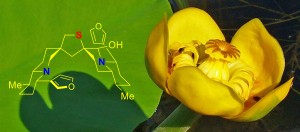
Education:
Princeton University (A.B. 1994−1998)
Harvard University (Ph.D. 2001−2005)
Stanford University (NIH Postdoctoral Fellow 2005−2007)
Work Experience:
Professor, Dartmouth Chemistry, 2021−present
COBRE Institute for Biomolecular Targeting, 2018−present
Molecular Therapeutics Research Program, 2012−present
Associate Professor, Dartmouth Chemistry, 2013−2021
Assistant Professor, Dartmouth Chemistry, 2007−2013
Associate Chemist, Merck Process Research, 1999−2001
Research Interests: Research in the Wu group focuses on the development of new reactions for synthesizing compounds that have potential therapeutic value. These include (4+3) and (3+2) cycloadditions with indole and other heterocycles, redox chain reactions, etc. In particular, we have identified molecules that can up-regulate the secretion of GLP-1 (glucagon-like peptide-1), inhibit the growth of MRSA, and induce apoptosis in leukemia cells. For each of these projects, we have teamed up with biological collaborators to study mechanisms of action and identify more potent analogues.
Our group has recently completed the first total syntheses of several members of the hydroxylated dimeric nuphar alkaloids [link]. These compounds, found in the yellow water lily (i.e. Nuphar japonicum, Nuphar lutea, and Nuphar pumilum), are able to induce apoptosis in model leukemia cell lines faster than any small molecule. We have also reported on the synthesis of the 1st apoptotically-active monomeric analogues [link]. Insufficient apoptosis is strongly linked to cancer and autoimmune disorders. There are also numerous diseases associated with excessive cell death such as AIDS, Alzheimer’s, Huntington’s, Parkinson’s disease, and amyotrophic lateral sclerosis (i.e. ALS / Lou Gehrig’s disease). A better understanding of the biological basis of how the nuphar alkaloids can so rapidly induce cell death, may lead to novel points of intervention for the design of prospective therapeutics and other diseases attributed to abnormal apoptosis.


